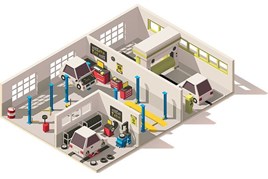Picking and prepping cars as efficiently as possible is critical to this industry. While each business will have its own unique spin, the one similarity is that the approach has to be fluid, to match stock profile mix and knowing when to walk away before over-committing to costly repairs on a car.
Top five ID50 group, The Car People, have a process that is designed to suit individual vehicles across its four sites and stock profile.
The group’s core stock is between two to four years old with between 25,000 and 40,000 miles. However, there is still a range of stock between 12 months to eight years ranging from 4,000 miles to 60,000.
Jonathan Allbones, The Car People director, said: “Due to the different types of stock, the preparation process isn’t completely linear.
“We investigate every vehicle and I think while cosmetic repairs are very easy to cost up, it’s the mechanical element which can be more difficult. Electronic and module problems in particular can be costly to sort out.
“But essentially, if the car has the margin there and it needs work doing, then we’ll do it.”
The Car People have five different preparation levels: 1, 2C, 2, 2+ and 3. The parameters for these levels are set around the vehicle’s age and whether it is still covered under a manufacturer’s warranty.
Vehicles at level 1 are pristine, through to level 3 where there is no evidence that the correct service has been done in line with the vehicle’s age and mileage.
The Car People are obsessive when checking stock before handover with the customer, with eight checks from start to finish for each car.
On a slightly smaller scale with single site Specialist Cars in Stoke, owner Umesh Samani personally inspects each car. Around 80% is bought direct from the public and the rest is from select trade dealers.
He uses his own experience to determine how much money should be spent on prep, but again there isn’t a set amount – it just depends on the car and margin.
Samani said: “I check the dials, the infotainment system, the electric windows. Everything.
“If I’ve bought the car right, I can work in some touch-ups on the wheels and paintwork.”
Each car will also go through Samani’s own service and MOT workshop, even if it’s recently been serviced, because he has to see for himself that it’s up to standard.
Preparation for vehicles can be outsourced too. BCA Fleet Solutions offers that with car inspections, PDI and vehicle preparation.
Tony Booth, managing director of BCA Fleet Solutions, said: “By outsourcing the preparation, delivery and management of these vehicles, it provides dealers with a scalable solution that frees up valuable workshop space for other, more profitable activities.
“It is designed to deliver a flexible service that can quickly scale to meet changes in demand and seasonality.”
Bryan Stringer, Manheim Vehicle Solutions director, said speed and margin are everything in the wholesale arena.
Stringer said: “Vendors want to sell cars as quickly as possible for the best possible price and they know that preparing cars to a higher standard gets them results.”
Manheim Vehicle Solutions can also prep cars to a retail-ready state, which Stringer said can reduce the level of investment needed for something on site.
Manheim also offers an ROI calculator tool for dealers to use data to inform what repairs are worth doing.
Allison Nau, Cox Automotive Data Solutions managing director, said: “Dealers know that by repairing minor damage to vehicles they can add significant value; the hard part is knowing exactly what will add value and what’s simply a waste of money.
“An increasing number of customers are adopting this data-driven approach, taking the guesswork out of reconditioning.”
Fully preparing vehicles before display is an approach Jim Reid, director at Jim Reid Vehicle Sales (JRVS), also takes, although it’s done in-house rather than outsourced.
Reid said: “The idea is that while it might take a little more time to get them ready for the forecourt, it speeds things up overall.”
Reid added that prepping cars totally before sale means you’re not going in blind on how much needs to be spent to get the car ready for retail.
He said: “You know all the figures before that car has been listed, you know the margin and price you need.
“It also means that if any customer comes in, they don’t need the car to be prepped, they can test the car and it will be sparkling, and they can drive away the same day if they want to as well. If you do get customers that are browsing because they’re looking at what’s out in the market, you’re going to be top of the list if they know the preparation of vehicles is top notch.”
Determining market position
Reid said: “A lot of deciding on your position is dictated by market forces and your local competition.
“Our profile was heavily towards Ford and Vauxhall but a new dealership opened near us and the new car offers were putting pressure on our nearly-new prices and margins.”
Reid shifted focus to a slightly higher end market with a mix of cars across the spectrum.
JRVS has bought stock in the Aberdeen area that had been handed back to finance companies, and has now built up a reputation for buying performance cars from private sellers too.
He said: “If you’re just selling all cars priced at £5,000 the risk that something unexpected may happen with the car is higher, and you’re working with smaller margins.
“With higher priced stock you’re spending more at the outset, but you have more margin and they are less likely to have issues.
“The higher price also gives you the chance to bring in some income from finance too.”
In-house vs outsourcing
The Car People keep preparation in-house as much as possible.
Allbones said: “It gives us a lot more control on costs, training and time.
“I think with outsourcing it can delay preparation and it’s really important to get these cars ready to be sold as quickly as possible.”
Samani has a mixture in his vehicle preparation supply chain. He acquired the service and MOT business on the same site as his sales centre to help him control costs. He said having the business on site also means if there are any problems with vehicles he can sort them straight away, without having to wait to book cars in at a local garage.
He outsources bodyshop and valeting work for flexibility.
Samani said: “Outsourcing gives me the flexibility to increase or decrease the amount of work when needed.
“I’ve been working with the bodyshop team for 20 years and the valeting team for around 15 years, so there’s a great relationship there.”
JRVS has two valeters and three technicians, with a mix of options, keeping service and valeting in- house and then outsourcing bodywork, alloy wheels, MoTs, paint and any vinyl wrapping work.
Reid said: “Having servicing and valeting in-house lets you keep control of quality. It’s particularly difficult to get the right attention to detail you might want if you outsource. It can become a box ticking exercise.”
With things such as MOTs or smart repairs, JRVS has some local businesses it uses.
Reid said: “If we’re doing the work on alloys or paint for example, if something goes wrong, we’ve got the costs involved with putting it right, whereas when you’re outsourcing, it lies with them.”











If you are not a registered user your comment will go to AM for approval before publishing. To avoid this requirement please register or login.
Login to comment
Comments
No comments have been made yet.